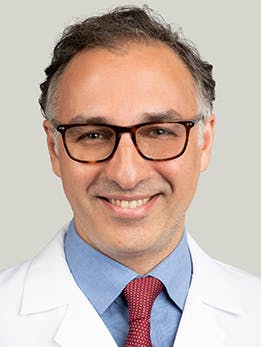What can erectile dysfunction tell you about your heart health?

Changes in your sexual performance can serve as a “check engine” light for your heart. If you notice that it’s more difficult to get an erection, it could be an early warning sign of a heart or vascular problem. But there’s good news: Treatment can help reverse your erectile dysfunction (ED) and improve your cardiovascular health.
At the Men’s Wellness Clinic at UChicago Medicine River East, our experts in urology, endocrinology, cardiology, vascular surgery and other specialities work together to treat the root cause of your sexual dysfunction and restore your quality of life.
How common is erectile dysfunction (ED)?
ED affects about 15% of men in their 40s and 50s, and nearly half of men in their 60s. It is even more common among men in their 70s and beyond.
If you sometimes have difficulty getting or maintaining an erection, recognize that you are not alone. At the Men’s Wellness Clinic, our specialists have treated thousands of men of all ages with ED. We are committed to uncovering the cause of your ED and helping you regain your sexual function.
What is the connection between ED and cardiovascular disease?
Erectile dysfunction may be the first sign that you have a heart or vascular issue that requires medical attention. This is especially true if you have trouble getting or maintaining erections in your 30s or 40s.
Research shows that ED can occur as early as three to five years before a major heart attack or other cardiovascular event. ED is also associated with a higher risk of dying from cardiovascular disease.
So, even though ED can be difficult to talk about, it’s important to mention any changes in your sexual health with your doctor. Doing so can help you find a solution to your ED — and protect your overall health in the long run.
Why is ED considered an early warning sign of cardiovascular disease?
One theory is that early atherosclerosis – or narrowing in the arteries – can trigger ED. When plaque builds up in the arteries, it can reduce blood flow throughout the body, including the penis. This can make it more difficult for men to get or maintain an erection.
What is clear is that many of the factors that raise a man’s risk for ED also increase the risk for cardiovascular disease. These include:
- Being older than 40
- Having high blood pressure
- Having diabetes
- Smoking
- Being overweight or obese
- Having high cholesterol
What does the research say about the link between ED and cardiovascular health?
We conducted a comprehensive literature review, which was published in the American Journal of Men’s Health, and found that men with ED should be considered at high risk for cardiovascular disease. Specifically, men with ED have a higher risk for developing high blood pressure, ischemic heart disease, peripheral artery disease and stroke. And, in men with diabetes, ED can be a sign of “silent” coronary artery disease that doesn’t cause any other symptoms.
That is why we encourage you to reach out to your doctor or a urologist as soon as you notice a change in your sexual health. Getting early treatment can reverse sexual performance issues and help you maintain your health.
How does the team at UChicago Medicine’s Men’s Wellness Clinic address a complex issue like ED?
We offer a holistic approach to treating men’s health in a convenient, respectful setting. When you come to our clinic, we can connect you to highly specialized experts, including urologists, cardiologists, vascular surgeons and endocrinologists who work together to reduce your risks and improve your sexual and heart health.
We can also help you with your other care needs and refer you to primary care physicians, certified sex therapists, sleep medicine specialists, weight loss specialists, physical therapists and other experts at UChicago Medicine. Whenever possible, we try to schedule your appointments with multiple specialists as well as your tests on the same day. By working together, we can help you address your health challenges with a comprehensive, proactive approach.
What tests are available to diagnose ED and cardiovascular problems?
At the Men’s Wellness Clinic, we offer comprehensive cardiometabolic and vascular tests including penile injections, noninvasive penile and cardiovascular ultrasound for ED as well as a variety of advanced imaging tests to help us get a better view of your penis, heart and overall vascular health. This testing can uncover hidden conditions that may not cause symptoms, but can be serious, such as coronary artery disease, abdominal aortic aneurysms and peripheral artery disease.
We also offer genetic testing – including molecular biomarkers – to assess your risk for heart disease, diabetes and other conditions.
What can I do to lower my risks for developing ED and cardiovascular disease?
Eating a healthy diet, losing weight, exercising regularly and not smoking are some of the steps you can take to protect against cardiovascular disease and maintain your sexual health. But we recognize that making these lifestyle changes is not always easy. That is why we offer a team-based approach to care at the Men’s Wellness Clinic. We can connect you to the resources and support you need to make lasting lifestyle changes.
But not every patient needs to make major changes to address their ED and heart health. For some, the solution may be as simple as optimizing their blood pressure medication. That is why we encourage you to seek help if you are struggling with ED.

Omer Raheem, MD
Omer Raheem, MD, is a board-certified urologist specializing in men’s sexual health and male infertility. Dr. Raheem leads the Men's Wellness Clinic at UChicago Medicine River East.
View Dr. Raheem's physician bio